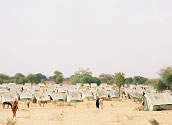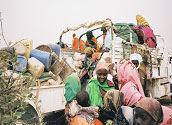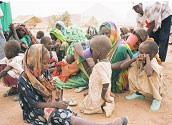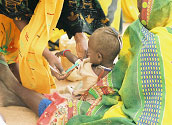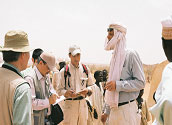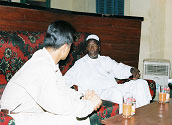Dispatch of a Refugee Survey Mission to Darfur, Sudan and Provision of Aid
(approximately USD 6 million)
|
Ethnic conflict between nomadic Arabs and settled agriculture-oriented African villagers (both groups are Moslem) has been worsening for two years in the Darfur region of western Republic of Sudan adjoining the border with the Republic of Chad. Even after a ceasefire accord was signed by the Sudanese government and the anti-government forces of Darfur, Arab militia known as "Janjaweed" have been committing inhumane acts against the African people in the area, such as attacks, rape and forced migration. There are now over one million internally displaced persons in Sudan, with some 200,000 refugees having fled to neighboring Chad. The humanitarian danger is growing more serious under the extreme geographic and climate conditions: daytime temperatures reach 50ºC in the desert and when the rainy season arrives, movement and transport on the dirt roads becomes almost impossible. A joint survey mission of Ministry of Foreign Affairs, the Japanese office of the United Nations High Commissioner for Refugees (UNHCR) and Japanese NGO was dispatched to eastern Chad, which borders on Darfur, from May 30 to June 6 to assess the humanitarian situation of the Sudanese refugees. The mission surveyed refugee camps in the area and held dialogue with government officials and aid workers. This joint survey mission was the second earliest one which was dispatched from aid donor countries to stay in the region of the refugee camps and complete a survey, after a similar mission of the United States. Of the seven refugee camps set up at the time of the survey, the mission visited three camps, Farchana, Bredjing and Mile and was briefed by UN and NGO workers. It also had interviews to refugees (the majority of whom are women, children and elderly people). One elderly man among the refugees transported from the border area to a refugee camp by an aid organization truck to avoid attacks by the militia said, "My village was attacked eight months ago. It took four months to arrive at a border point on foot avoiding militia's assault. We spent another four months near the border before finally reaching this refugee camp." The mission also met with government officials of Chad and governors of the local province of Ouaddai and prefecture of Guereda to exchange opinions on aid to the Sudanese refugees. The governors said the problems went beyond the capacities of the local Chadian hosting communities, which were also under a harsh environment and exhausted by an influx of refugees. Hence, they requested the support from the international community to their local communities as well. As a result of the survey, the mission is convinced of the urgent need for assistance, especially of food, water, toilets and the prevention of infectious disease, as well as transport capacity on both land and air routes. The mission also believes that environmental measures to conserve precious vegetation and water resources are vital. Based on the results of the survey, the Government of Japan announced on June 11 that it would provide a total of USD 6 million in humanitarian assistance to the people of Darfur through the World Food Programme (WFP), UNHCR, United Nations Children's Fund (UNICEF) and the International Committee of the Red Cross (ICRC), all of which had been implemented by the end of August. |
|
Back to Index

